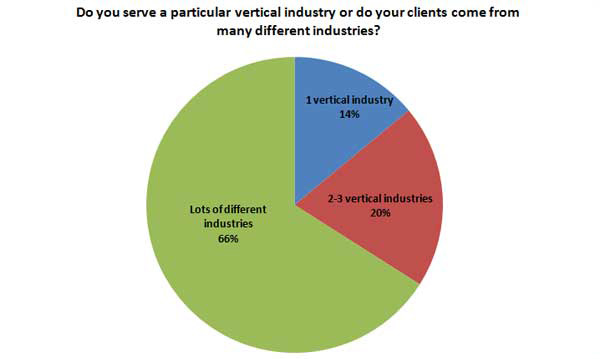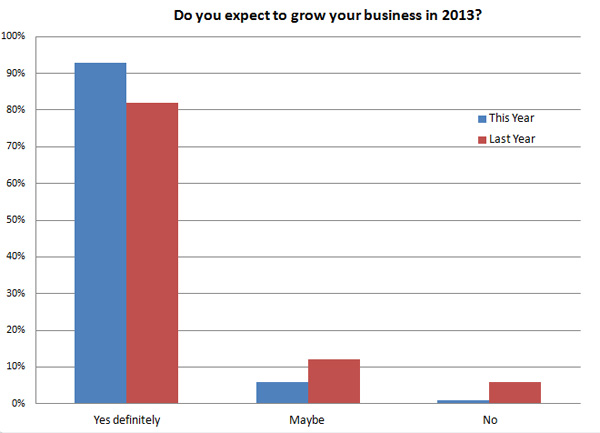About the BrightLocal Local SEO Industry Survey
The objective of this survey is to gain greater understanding about the health & nature of the local SEO Industry. Through this survey we aim to find out what life is like ‘on the ground’ for those in the local SEO industry and to share those findings publicly to help improve the knowledge and insight within our industry.
BrightLocal Local SEO Industry Survey 2013
This is the 2nd wave of the survey. The 2013 survey was conducted between 20th January – 20th February 2013. 1,409 SEOs completed this survey (up from 1,150 in 2011) and we thank them for giving us their time & information to make this survey possible.
The 1st wave was conducted in July 2011 and the findings can be found here.
The survey asks questions specific to Local SEO and was promoted to the full BrightLocal user base and our network of SEOs & agencies. The majority of survey respondents are SEO freelancers, small digital agencies and web designers so the results are indicative of this audience.
We opted to update and change some of the questions asked in wave 2 vs. wave 1. There are 17 questions which cover 5 key areas:
- Size & Turnover
- Clients & Industries
- Marketing & Sales
- Services & Tasks
- Future Outlook
We have made the following charts available for download as a PDF so that you can use them as a presentation in your reports. Download it here Local SEO Industry Survey 2013.
Size & Turnover
1. How many people in your company are SEOs?
- 82% of respondents said that they have just 1-5 practicing SEOs in their company
Comment:
As a provider of local SEO tools, the majority of our users are small digital agencies, SEO freelancers and web-designers. Therefore it’s not surprising that 82% of respondents said that they have just 1-5 SEOs in their business.
2. What was your turnover in the last 12 months?
- 34% of SEOs turnover was less than $30,000
- 17% said that their turnover was above $500,000
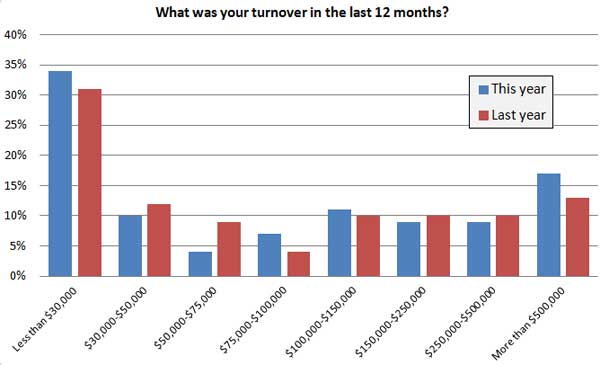
Comment:
It’s interesting to see the spread of revenue which local SEO/agencies earn. At one end of the market some SEOs appear to be struggling with turnover less than $30,000; while at the other end 17% said they earned $500,000 or above. Size of the agency and the quantity of clients handled is obviously a significant factor in turnover so you’d expect smaller agencies to earn less, and vice versa for larger operations. Turnover isn’t necessarily a sign of a successful agency, but we felt that asking for profit numbers would put respondents off answering
There doesn’t appear to be a clear shift in earnings level since 2011 so it’s hard to predict which way the market is headed. There is healthy demand for local SEO services as more and more local businesses turn to online/mobile to reach local consumers. However the competition between SEOs has never been greater as more people enter the industry or expand their services to provide local SEO/marketing.
SEO is a complex, skilled & intellectual profession which is in great demand. Now is the zeitgeist of our industry, so it’s surprising to hear that 34% of SEOs earned less than $30,000 in the last 12 months. It poses a few questions –
- Are SEOs pricing their services too low?
- Do SMBs not value or understand the value provided by their SEO/agency?
- Is excessive competition in the industry forcing SEOs to price themselves low to undercut others?
- Can SEOs really provide a good quality service while earning $30,000 or less?
- How many SEOs will still be in business next year if they can’t increase their income?
Note – part time SEOs & ‘newbie’ SEOs would pull this turnover down as they are not operating at full capacity and maximising their revenue potential.
3. What does an average customer pay you each month?
- 28% of customers pay between $500-$1,000 per month for SEO services
- 70% of customers pay under $1,000 per month for SEO services
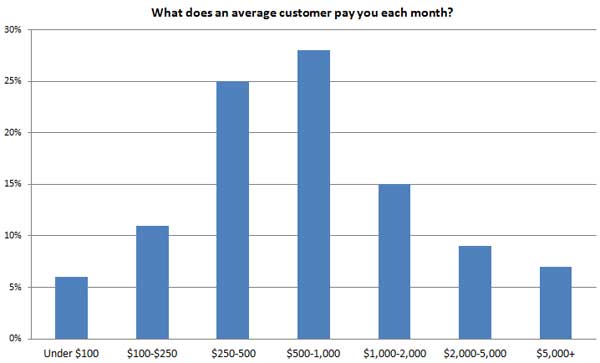
Comment:
As is the case with agency turnover, the income per customer also varies greatly across the industry. Some clients pay less than $100/month while others pay $5,000 or more. The type of services provided and the depth of service will dictate the price point, as will the size of the customer’s business – the budget & requirements of a small mom & pop business are much smaller than a multi-location franchise business.
If we read between the lines a little, what this data shows is just how broad the nature of service is from SEOs. Some operate on a high volume basis, providing a lightweight or ‘cookie-cut’ service for a very low monthly rate. These businesses typically have higher customer churn and a large, dedicated sales team. Other SEOs offer a much more comprehensive service with a tailored approach for each client and therefore they service a lower number of clients.
As an SEO you can pitch yourself at the point where you operate best, which matches your set-up. There is demand from businesses for services the whole way along this value range; although you can guarantee that every client out there wants more of your time for less of their money.
Clients and Industries
4. How many clients do you personally handle?
- Most SEOs handle between 6-10 customers
- 71% of SEOs handle 6 or more customers
- 23% of SEOs handle 21 or more customers
- 11% are new to SEO this year
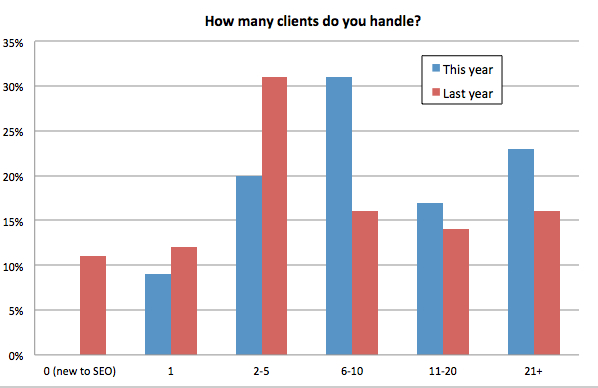
SEOs are handling more clients this year than they did last year. 40% of SEOs handle 11 clients or more, with 23% handling 21 or more customers. That mounts up to a lot of audits, research, tasks, reports and client calls each month. Efficiency is the key to working successfully with this many clients; effective SEOs are process-driven creatures who know how to strip away unnecessary tasks and focus on the critical tasks which deliver results for their customers.
Or maybe they just work every hour god gives them! Probably both!
5. Do you serve a particular vertical industry or do your clients come from many different industries?
- Just 14% of SEOs/agencies target 1 vertical industry
- 20% of SEOs target 2-3 specific industries
Comment:
The majority of SEOs/agencies don’t target their services at specific industries but take on clients from any sector. There are pros & cons from both approaches –
- All Industries – this approach keeps your client pool broad allowing you to take on any potential client. It keeps work interesting because you’re learning about different sectors and which tactics work best for different business types. You are exposed to issues & solutions which you can bring to bear on your clients in other industries. It reduces competition between clients because they’re not all in the same sector. You can focus your sales/lead-gen to a tighter geographic area because you won’t exhaust your supply of potential clients too soon.
- Specific Industries – this allows you to develop a specialism in 1 or 2 industries and build up a reputation as an expert in this sector. You can develop an efficient set of strategies and apply these to all your clients making your work effective and efficient. You can easily target your marketing & sales to reach businesses in these sectors and develop relevant case studies and success stories which gives confidence to owners of similar businesses.
Marketing and Sales
6. Which channels are most effective for attracting new customers to you / your agency?
- 3 of the most effective channels for attracting new customers are offline channels
- Word of mouth is the most effective channel – 91% said bought them most leads
- SEO was the 2nd biggest driver of leads & customers (46%)
- LinkedIn (18%) is more effective than Facebook (11%) & Twitter (10%)
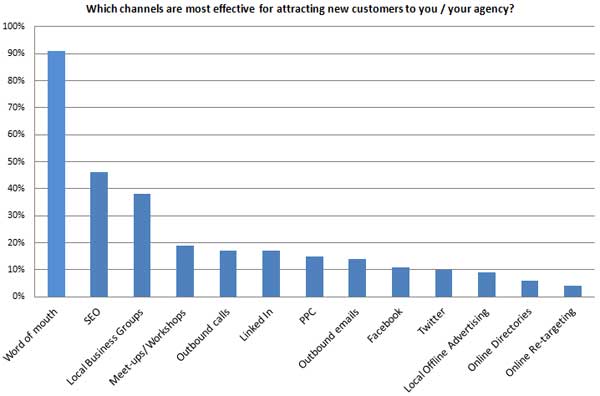 *Note – respondents were asked to select max 3 answers
*Note – respondents were asked to select max 3 answers
Comment:
The results of this question show how important reputation & relationships are when selling & buying SEO services. The 4 most effective sales channels are all driven by trust, reputation & relationships. Local business owners are far more likely to commit their precious (even scarce) marketing budget to someone they know, like and trust; and a big portion of this trust comes through recommendation by others.
A increasing number of our agency customers tell us that LinkedIn is a good driver of new business. SEOs are B2B service providers so LinkedIn is a better fit for networking & lead generation vs. facebook, twitter & pinterest.
It’s also interesting to note that SEO far outstrips PPC as a lead gen channel. The proof is in the pudding for local businesses – “if they can get their own business to rank well in search, then they can do the same for me”.
7. How many new leads do you proactively contact each month?
- 32% of SEOs don’t make out bound sales enquiries (down from 46% in 2012)
- 11% of SEOs make over 50 sales enquiries each month
Comment:
It appears that SEOs are having to work harder to win new customers. In 2012 46% of respondents didn’t do any outbound sales but that dropped to 33% this year. At the other end of the scale some SEOs are supercharging their outbound sales and hitting more than 50 potential clients each month.
We speak to a large number of SEOs every week and the approach to sales varies greatly. Some agencies are very sales focused with dedicated sales teams and aggressive growth strategies. For freelancers & smaller agencies the job of lead-gen & sales typically falls to the SEO or agency boss; it’s 1 task in a long line of daily tasks and gets done when it gets done. And some, more established agencies, are not interested in growing; instead they want to maintain the current status quo and focus on maintaining their existing customer base.
So there’s no right or wrong approach to sales, and certainly no ‘golden number’ for new customers you should contact each month. It really depends on how you position your business, what your ambitions are and how established your business is.
8. What is your success rate at converting leads to customers?
- 42% is average success rate for converting new leads to customers
- 29% of SEOs convert more than 70% of leads to customers
- 17% convert less than 10% of leads
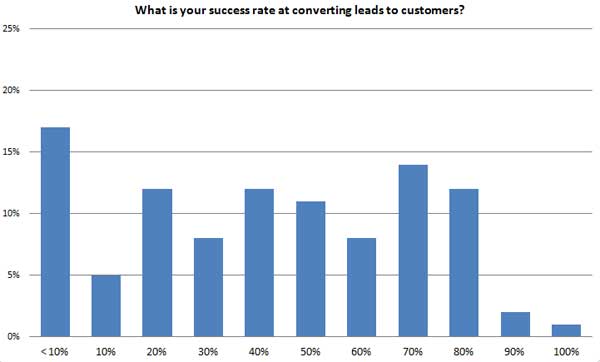
Comment:
Sales conversion rates vary greatly in the industry. With average conversion at 42% that’s a decent level, however 17% of SEOs say they convert less than 10% of their pitches.
However the chart only shows part of the picture. Conversion rates are a product of a number of factors including method of approach, quantity of leads contacted, sales structure & ability, business reputation, local market competition etc…. I would expect that agencies who take a more considered & tailored approach to pitching will covert more than those with a high-volume, sales-led model.
Chart 6 above shows how important ‘Reputation’ is to selling SEO services. Having a solid & demonstrable reputation (e.g. client testimonials, success stories, positive online star rating) will considerably improve sales conversion so SEOs/agencies should focus on building a positive reputation and building their sales approach around this. Client testimonials and published success stories are excellent devices for demonstrating your ability & publicizing that hard earned reputation.
Services and Tasks
9. What SEO / online marketing services do you offer?
- 91% of SEOs offer on-site optimization
- 86% of SEOs offer Google+ Optimization
- Only 11% offer affiliate marketing
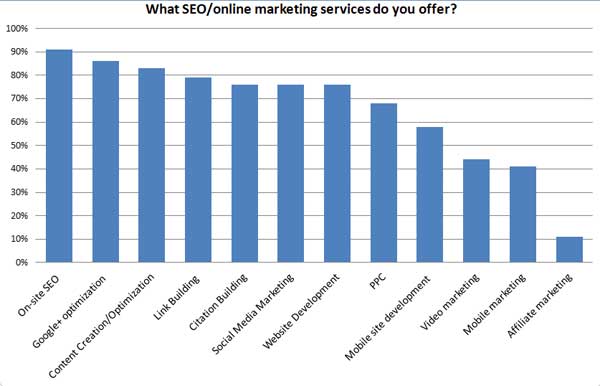 *Note – respondents were asked to select max 3 answers
*Note – respondents were asked to select max 3 answers
10. Which service is most in demand from your customers?
- On-site SEO & Google+ Optimization are most in-demand services.
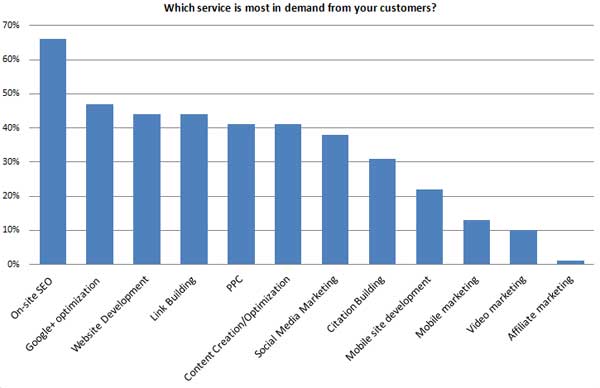
*Note – respondents were asked to select max 3 answers
Comment:
The services most & least in demand from clients closely mirrors the services which SEO/agencies provide (& don’t provide).
In our regular workshops with our SEO agency customers it’s clear that in most cases the take up of new services by clients is driven by what their agency supplies. Most SMBs aren’t aware of the opportunities presented by video & mobile marketing so they need to be educated by their agencies on the benefits and potential of these channels.
In the local arena, digital marketing is driven by the supply side because knowledge resides firmly in the minds of SEOs & digital marketing professionals. The services offered often dictate what customer’s purchase. It’s simple business practice – develop a new service, learn how to effectively sell it and up sell your customers to grow your revenues.
Interestingly 43% of SEOs offer video marketing & 41% offer mobile marketing services. These percentages are small in comparison to on-site SEO & Google+ optimization but they are growing. Forward thinking SEOs are embracing these offerings and selling them in to new & existing customers.
11. Which of these online channels is most effective at generating customers for your clients?
- 82% of SEOs said that ‘General search’ is the most effective channel for generating leads/customers
- ‘Local search’ is the 2nd most effective channel (62%)
- PPC is 3rd with 53% and social media 4th with 26%.
- Only 1% of SEOs said that Daily Deals were effective at generating leads/customers.
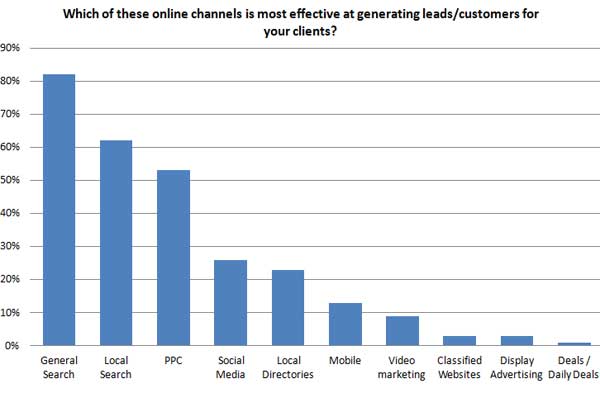 *Note – respondents were asked to select max 3 answers
*Note – respondents were asked to select max 3 answers
Comment:
It is clear that the majority of sales come from 3 channels –
- General Search
- Local Search
- PPC
Social media is more effective than local directories and mobile. In future we expect the contribution of social & mobile to grow but directories to drop as audiences find less & less value in using local directories. Why? well…
- Recommendations from friends carry more weight & significance than simple business listings and reviews by strangers
- Mobile usage is growing at a staggering rate and is particularly relevant for local businesses
About ‘Daily Deals’ – we would have got a different answer has we asked specifically about ‘sales’ rather than ‘customers’. There is plenty of debate about the long term benefit of Daily Deals for businesses. Yes they generate short term sales (no disputing that) but the jury is out on whether DD is effective at generating genuine, new customers & value long term value for businesses – a criticism often leveled at the likes of Groupon, LivingSocial and others in this space.
12. Do you believe that Social Media is an effective marketing channel for local businesses?
- 82% of SEOs said that social media is an effective channel for local businesses (vs. 76% in 2011)
- 25% said that social media is ‘very’ powerful, while 57% said it works well for certain business types
- 18% of SEOs are undecided or felt social media was over-hyped (vs. 24% in 2011)
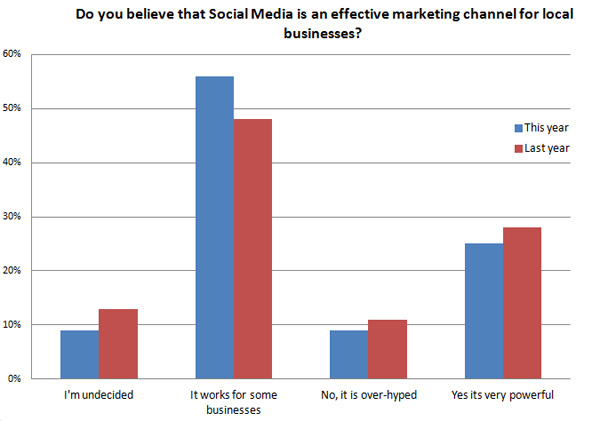
Comment:
It appears that social media is winning over more local SEOs. 6% more SEOs believe social media is an effective channel year than last year. The majority still believe that social media works for some businesses types but not all, meaning that different businesses will see different levels of return and impact from promoting themselves & engaging their customers on twitter, Facebook etc…
As social shares become an ever more important factor in SEO performance, the impact of social media stretches well beyond direct sales & customer engagement on these platforms. Some SEOs believe that likes, tweets, check-ins, pins etc… will grow to rival links as a critical SEO signal and therefore it will become important for all businesses to engage with social media. Now is the time for business owners who don’t use social media to work out how & when they should use it and get committed to ‘social’.
13. Which of the following SEO & business tasks do you tackle in a typical week?
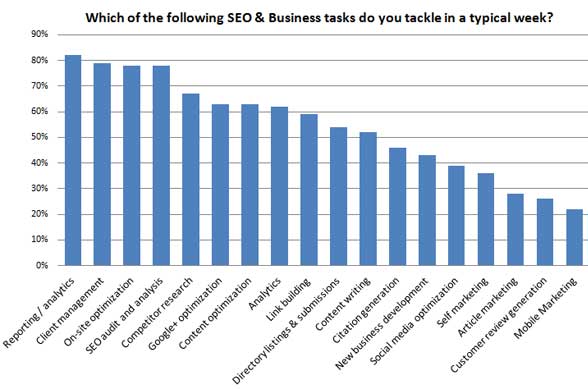 *Note – respondents were asked to select max 3 answers
*Note – respondents were asked to select max 3 answers
Comment:
SEOs tackle a wide range of tasks each week, from analytics & auditing through to manual link building to social media to self-marketing.
This is proof of the huge diversity of tasks a modern SEO has to deal with and the range of skills they need to do it well. SEO is such a complex discipline (especially at the freelance/small agency level where specialization is a luxury not many people have) which requires great adaptability and the ability to multi-task at great pace. But it also requires a good analytical brain to process the data we work with, draw conclusions and act on them.
Long live SEOs! – multi-tasking super heroes of the modern business world (IMHO anyway)
14. Which of the following SEO & business tasks do you find to be the most time-consuming and tedious?
- 55% of SEOs say they find link building the most time consuming/tedious task they do
- 15% of SEOs say that content writing is the most time consuming/tedious task they do
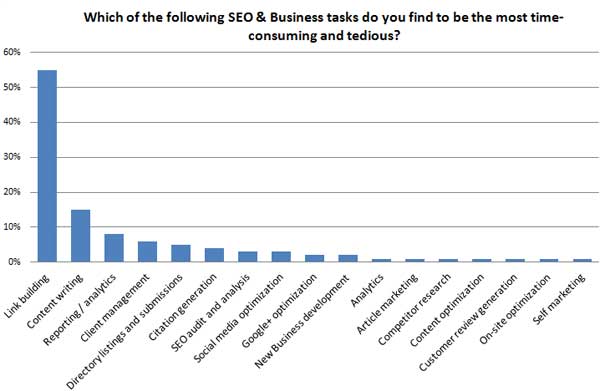
Comment:
Who’d have thought it?! Most SEOs find link building boring – go figure?!
Disclaimer – I’m a little biased because I’m impatient and don’t have the meticulous & persistent nature that good link builders have. In fact I would say that I suck at link building because I just don’t draw any satisfaction from it, but i respect those that do it well
Future Outlook
15. Do you expect to grow your business in 2013?
- 93% of respondents said Yes (vs. 82% in 2011)
16. Are you planning to recruit more staff in 2013?
- 82% of respondents say they will recruit more staff this year
17. Which of these phrases best describes your hopes & expectations for 2013?
- 84% of respondents are confident that 2013 will a good or great year for their business
- Just 4% said that it’s going to be a difficult year
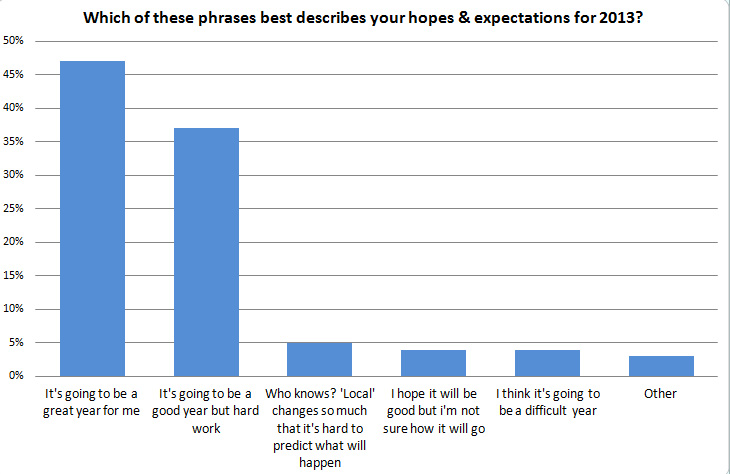
Comment:
Confidence is running high in the SEO industry. There can’t be many industries in the current economy that can boast such a positive outlook.
Agencies are looking to grow in 2013 and recruit staff to help drive & fulfill that growth.
The only blot on the horizon for the Local SEO industry is the nearly perpetual change it goes through. Our industry is very dynamic & innovative but this constant change makes life uncertain for SEOs and means we need to be ready to adapt our services and approach at all times. This can be frustrating and difficult as we need to keep clients abreast of these changes; this in turn frustrates them and makes SEO an even more impenetrable subject.
What this industry is desperately in need of is simplification and consistency with fewer options and less change. This may sound like a negative view but we need to increase understanding of SEO/social among business owners and give them confidence in the services we provide so that they keep investing and keep transferring the budget from other channels to digital channels.


